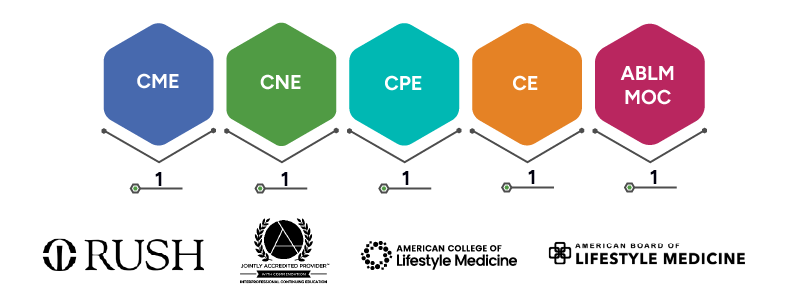
Impact of Lifestyle Medicine Interventions on the Management of Systemic Hypertension in Primary Care: A Canadian Randomized Controlled Trial (AJLM CME/CE Article Quiz Volume 18, Issue 5)
The study aimed to evaluate the feasibility of implementing lifestyle interventions in primary care settings with hypertensive patients and their effect on blood pressure, body composition, cardiometabolic markers, and antihypertensive drug use. Sixty participants diagnosed with stage 1 hypertension were randomly assigned to 4 groups: (1) Standard medical care (control), (2) Physical activity protocol, (3) Dietary Approach to Stop Hypertension (DASH) diet, and (4) Combination of physical activity protocol and DASH diet. Participants received counseling from family physicians, nurses, kinesiologists, and registered dietitians. Various assessments were conducted before (T0) and after (T6) the interventions, including 24-h ambulatory blood pressure monitoring, blood and urine tests, anthropometric measurements, computed tomography to measure adipose tissue, submaximal exercise test to estimate maximal oxygen consumption and health questionnaires. Fifty-one (51) participants (51/57, 89%) completed the program. All interventions reduced blood pressure indices between T0 and T6, except the combined interventions group. Body composition and cardiometabolic parameters were improved in all groups, except for the control group. In total, 28% of participants (7/23) reduced or stopped their antihypertensive medications at T6. The results suggest that structured lifestyle interventions are feasible in primary care and improve blood pressure and cardiometabolic parameters in patients with stage 1 hypertension.
This course expires September 2nd, 2027, at 11:59 PM PST.
Course Format
This course consists of 1 AJLM article and 1 hour of content.
Target Audience
This course is applicable for interprofessional healthcare team, including physicians, registered nurses, nurse practitioners, physician associates, registered dietitians, physical therapists, occupational therapists, pharmacists, other health professionals working with chronic disease prevention or treatment, and clinicians in training.
Learning Objectives
After studying the article, learners will be able to
- Describe the dietary and physical activity interventions used to reduce blood pressure.
- State the minimum difference in systolic blood pressure (SBP) this study was designed to detect.
- Determine which interventions reduced SBP and diastolic blood pressure (DBP).
- Compare the effect of lifestyle interventions on blood pressure in participants who were taking anti-hypertensive medications and those who were not on these medications.
- Jonathan Bonnet, MD, MPH, DipABOM, DipABLM, FAAFP, FACLM
- Micaela Karlsen, PhD, MSPH

Accreditation Statement, Disclosure Information and Credit Designation Statements
Accreditation Statement: In support of improving patient care, this activity has been planned and implemented by RUSH University Medical Center and American College of Lifestyle Medicine. RUSH University Medical Center is jointly accredited by the Accreditation Council for Continuing Medical Education (ACCME), Accreditation Council for Pharmacy Education (ACPE), and the American Nurses Credentialing Center (ANCC), to provide continuing education for the healthcare team.

Disclosure Information
Unapproved Uses of Drugs/Devices: In accordance with requirements of the FDA, the audience is advised that information presented in this continuing medical education activity may contain references to unlabeled or unapproved uses of drugs or devices. Please refer to the FDA approved package insert for each drug/device for full prescribing/utilization information.
It is the policy of the Interprofessional Continuing Education office at RUSH to ensure that its CE activities are independent, free of commercial bias. Therefore, we manage all financial relationships associated with accredited continuing education activities. RUSH asks everyone who has the ability to control or influence the content of an educational activity to disclose information about all of their financial relationships with ineligible companies within the prior 24 months.
An ineligible company is an entity whose primary business is producing, marketing, selling, re-selling, or distributing healthcare products used by or on patients. There is no minimum threshold; individuals must disclose all financial relationships, regardless of the amount, with ineligible companies. Individuals must disclose regardless of their view of the relevance of relationships to education. Mechanisms are in place to identify and mitigate any potential conflicts of interest prior to the planning, implementation, or evaluation of the continuing education activity. If a financial relationship is identified for the person in control of content, conflict mitigation strategies will be used to mitigate the financial relationship before they assume their role.
Individuals in control of content for this activity have the following relevant financial relationships with ineligible companies to disclose and all financial relationships have been mitigated.
- Rohit Moghe, PharmD, MSPH, CDCES: Member, Speaker's Bureau - Novo Nordisk
All other individuals in control of content have no relevant financial relationships with ineligible companies.
Available Credit
- 1.00 ABLM MOC
The American Board of Lifestyle Medicine has approved 1.00 maintenance of certification credits (MOC) for this learning activity.
- 1.00 ABS Accredited CME
Successful completion of this CME activity, which includes participation in the evaluation component, enables the learner to earn credit toward the CME of the American Board of Surgery’s Continuous Certification program. It is the CME activity provider’s responsibility to submit learner completion information to ACCME for the purpose of granting ABS credit.
- 1.00 ACPE Pharmacy
Rush University Medical Center designates this knowledge-based Enduring material for a maximum of 1.00 contact hour(s) for pharmacists.
- 1.00 ACPE Technician
Rush University Medical Center designates this knowledge-based Enduring material for a maximum of 1.00 contact hour(s) for pharmacy technicians.
- 1.00 AMA PRA Category 1 Credit™
Rush Medical Center designates this Enduring material for a maximum of 1.00 AMA PRA Category 1 Credit(s)™. Physicians should claim only credit commensurate with the extent of their participation in the activity.
- 1.00 ANCC
Rush University Medical Center designates this Enduring material for a maximum of 1.00 nursing contact hour(s).
- 1.00 APA
Rush University Medical Center designates this Enduring material for 1.00 CE credits in psychology. Continuing Education (CE) credits for psychologists are provided through the co-sponsorship in the American Psychological Association (APA) Office of Continuing Education in Psychology (CEP). The APA CEP Office maintains responsibility for the content of the programs.
- 1.00 ASWB
As a Jointly Accredited Organization, Rush University Medical Center is approved to offer social work continuing education by the Association of Social Work Boards (ASWB) Approved continuing education (ACE) program. Organizations, not individual courses, are approved under this program. Regulatory boards are the final authority on courses accepted for continuing education credit. Social workers completing this course receive 1.00 general continuing education credits.
- 1.00 Attendance
Successful completion of this course activity, including active participation in the evaluation component, entitles the learner to receive a participation certificate from ACLM. Please note that this certificate is offered solely in recognition of engagement, and no academic or professional credit is awarded.
- 1.00 CPEU
This Enduring material has been approved by the Commission on Dietetic Registration. Completion of this activity awards 1.00 CPEUs.
- 1.00 Occupational Therapy CE
Rush University Medical Center is an approved provider for physical therapy (216.000378) and occupational therapy (224.000220) by the Illinois Department of Professional Regulation. Rush University Medical Center designates this Enduring material for 1.00 continuing education credits.
- 1.00 Participation (AMA PRA Category 1 Credit™ for non-MDs)
Rush University Medical Center designates this Enduring material for a maximum of 1.00 AMA PRA Category 1 Credit(s)™. Physicians should claim only credit commensurate with the extent of their participation in the activity.
- 1.00 Physical Therapy CE
Rush University Medical Center is an approved provider for physical therapy (216.000378) and occupational therapy (224.000220) by the Illinois Department of Professional Regulation. Rush University Medical Center designates this Enduring material for 1.00 continuing education credits.
Price
ACLM member and category discounts are applied at checkout.
To receive member-only pricing, please join as a member FIRST, then complete your course enrollment in a separate transaction. For more information, please click here.
| Non-member | ACLM Members |
|---|---|
| $40 | $0 |
Access to online material is granted through the term of approval, which ends September 2, 2027.
Participant User Agreement (Terms of Use and Copyright)
Before registering for a Continuing Education/Continuing Medical Education Course (“Training”) for the first time, carefully review the following conditions of usage at https://lifestylemedicine.org/terms-of-use-and-copyright/
Registering for an American College of Lifestyle Medicine Course indicates your acceptance of the Participant User Agreement and its terms and conditions.
Required Hardware/software
This course can be viewed on desktop or tablet using a modern browser and most mobile devices.

 Facebook
Facebook X
X LinkedIn
LinkedIn Forward
Forward